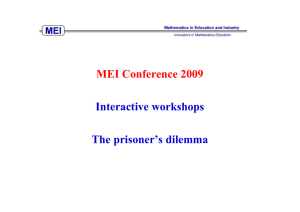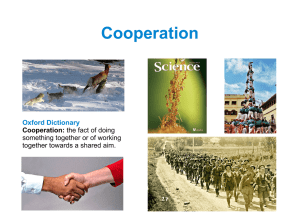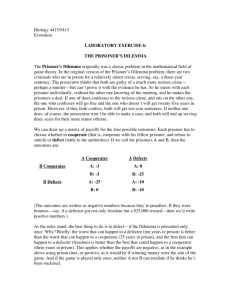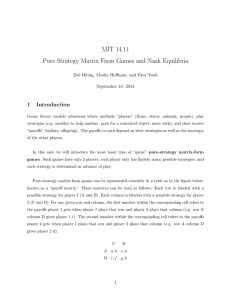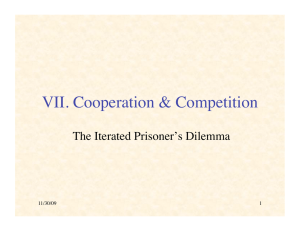References for this lecture: Robert Axelrod, "The Evolution of
advertisement
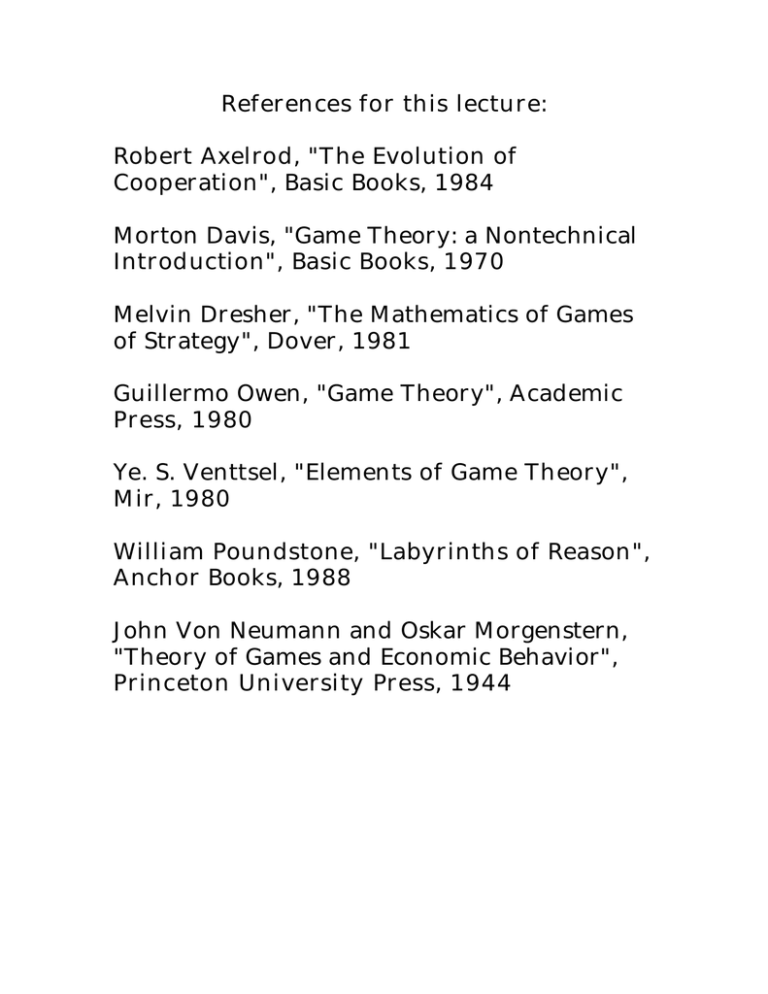
References for this lecture: Robert Axelrod, "The Evolution of Cooperation", Basic Books, 1984 Morton Davis, "Game Theory: a Nontechnical Introduction", Basic Books, 1970 Melvin Dresher, "The Mathematics of Games of Strategy", Dover, 1981 Guillermo Owen, "Game Theory", Academic Press, 1980 Ye. S. Venttsel, "Elements of Game Theory", Mir, 1980 William Poundstone, "Labyrinths of Reason", Anchor Books, 1988 John Von Neumann and Oskar Morgenstern, "Theory of Games and Economic Behavior", Princeton University Press, 1944 Game Theory: Theme and Variations • Zero- vs. non-zero sum • Two- vs. N-person games • Finite vs. Infinite number of choices • Games of perfect information • Iterated vs. non-iterated games Two-Person Zero Sum Games • The notion of a "dominant" choice • Tricks for reducing game matrices • The "solution" of a zero-sum game The "value" of a game The minimax theorem • "Pure" vs. "Mixed" Strategies • Symmetric games Non-Zero-Sum Games • The notion of an "equilibrium" point • The Prisoner's Dilemma and Axelrod's Tournament • Psychological experiments with Prisoner's Dilemma-like Games • Other considerations: "noise" (error) Populations/Geography Evolution of strategies • N-Person Games, and the notion of a "Solution Set" ALL-DEFECT simply defects on every game. (define (all-defect my-history other-guys-history) 'DEFECT) POOR-TRUSTING-FOOL cooperates on every game. (define (poor-trusting-fool my-history other-guys-history) 'COOPERATE) UNFORGIVING cooperates up until the first defection of the other player; then it defects from that point onward. (define (unforgiving my-history other-guys-history) (if (true-of-any? (lambda (other-guys-response) (eq? 'DEFECT other-guys-response)) other-guys-history) 'DEFECT 'COOPERATE)) TIT-FOR-TAT cooperates on the very first game; after that it simply repeats the other player's move from the previous game (i.e.cooperating or defecting at game n if the other player did the same for game n-1). (define (tit-for-tat my-history other-guys-history) (if (null? other-guys-history) 'COOPERATE (most-recent-play other-guys-history))) Game Theory in Cognitive Science • The assumption of rationality • Are strategies real? • The game of chicken and the paradox of omniscience • Finding the matrix Von Neumann/Morgenstern principles for analyzing N-person games with coalitions • Pareto Optimality A solution set should contain only solutions that have "Pareto Optimality", meaning that there are no other solutions in which all the players simultaneously do better. • Individual Rationality Any solution that includes a coalition must be "individually rational": no player in the coalition should do better by simply going it alone. • For any S1, S2 in a plausible solution set, it cannot be the case that S1 dominates S2. (S1 dominates S2 for an N-person game if there is a coalition of players that has the will and ability to adopt a new solution in which they-- i.e., the folks in the to-be-formed coalition -- all do better.) • Every solution not in the solution set is dominated by some solution in the set.
